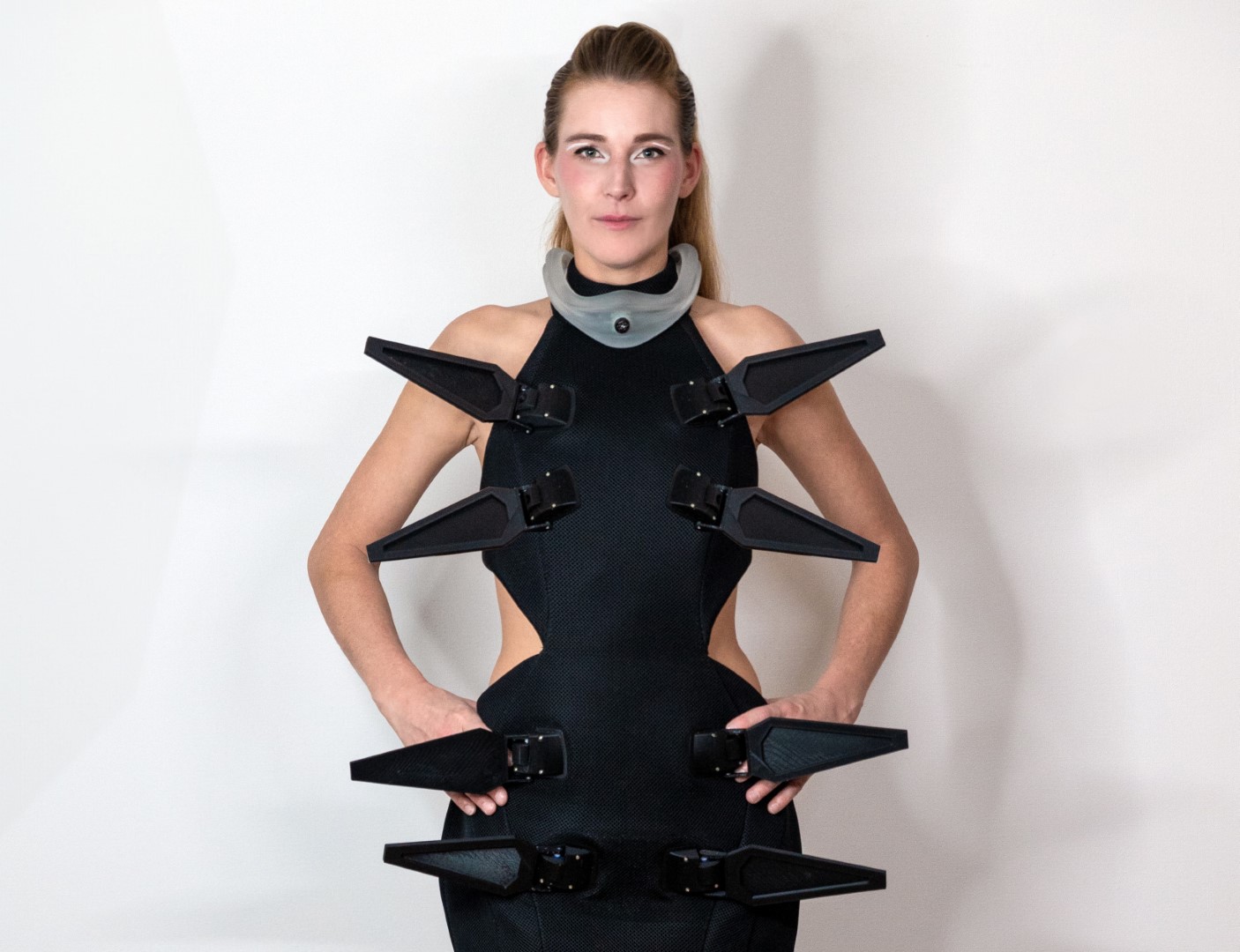Anouk Wipprecht Wants You To Build Her Open-Source Robotic Dress - 5 minutes read

I’ve seen a few mechanical fashion pieces walking around Maker Faires, and every single one turned heads everywhere it went. If you’ve ever gazed at someone strolling by in a servo-chic ensemble and thought about making one yourself, you’re in luck. Legendary Hi-Tech Fashion Designer Anouk Wipprecht is back with another incredible wearable creation.
Photo by Martijn Cruyff
The Scale Dress is jet black with eight actuators to hold large, black feathers. A sensor worn at the collar actuates the feathers in response to proximity. The garment is gorgeous on its own, but it’s really a showpiece for the open source platform she developed.
It’s a modular system so people with hobby-level 3D printers can make their own marvelous mechanical outfit. She was inspired after seeing so many students with brilliant designs struggle with the challenge of integrating mechanical servos and soft fabric. Rather than let them reinvent the wheel each time, she devised a 3D-printed solution that fits a range of materials and decorations. In this dress she shows off feathers, but it could be used for all kinds of lightweight attachments.
One of her dreams is to 3D print realistic feathers for this system – as most feathers are not ethically sourced – and the fashion industry uses a lot of feathers in couture.
Wipprecht designed the dress in Onshape, as a collaboration between her and 3D printing company Elegoo to announce their new “Female Empowerment Program.”
All the info
We had the chance to ask her for more details about the project, and she didn’t disappoint.
Can you share anything about the “Female Empowerment Program”?
The female empowerment program that we are launching with Elegoo is focused on creating an intuitive ecosystem – empowering women and girls in 3D printing and fostering innovation. We are trying to do this to both have more female role-models highlighted in the field and also create a structure of physical and online workshops, talk sessions, discussions, and hands-on DIY projects that people can learn from. It will be launched during FormNext this year.
Women have a pivotal role in the evolving landscape of STEM and 3D printing. In an industry where innovation and creativity are paramount, women have been instrumental in shaping the future of 3D printing technology. But within every field, promoting gender equality and inclusivity in the technology sector, especially within the 3D printing industry is still needed. We are not close to 50-50% equal gender in these fields.
Photo by Martijn Cruyff
Every individual, regardless of gender, should have equal opportunities to thrive and contribute to the advancement of technology. So our fight is still to inspire and empower future generations of female innovators through all means possible. And it’s also to encourage more women to pursue careers in technology, thereby enriching the industry with diverse perspectives and talents. It’s a really fun field, and I hope that more females will join in after seeing the possibilities of what you can create in the AM (Additive Manufacturing) world.
It’s great that the system is so modular. How do you imagine people using the mechanism?
Photo by Martijn Cruyff
I think it can be interesting for fashion designers and fashion design students that want to start prototyping with integrating motors and robotics into their garments, or for engineers that want to work with fashion & technology – as it’s an easy way to create a design that has moveable parts. The mechanisms sandwich in between the fabric and lining, and [only] the motor holder pops out. So it’s a very elegant way to connect little servo motors to your project and explore the field of #FashionTech.
What was the biggest challenge?
Photo by Anouk Wipprecht
Creating parts that were strong enough to hold the tiny motors, but sleek enough to integrate nicely into the upper layer of a fabric. That is the fun thing about design & engineering: the puzzles that you play while creating things, all the micro choices that can be made while making something. I love it.
Was there a moment of success where things just clicked into place?
Me and my friend Chuck Pitzer of Battle Bots were playing around with some systems of a helmet project (connecting robotics to a helmet) and from that point, the idea was – what other ways can there be to connect motors to ‘things’ and how can we come up with modular systems that can be educative for people to learn and explore with? That is I think where this started. It’s very fun to make modular systems and I would like to make them for more things than only motors: possibly also for the integration of LEDs, or sensors within garments: how would that look like, and how can that be open-sourced?
Build your own
Photo by Anouk Wipprecht
You can find out how to build your own on Instructables. And if you end up using this technique with your own materials, she wants you to know:
“Do share it back with me; tag me or DM me a photo of your design through my IG page (), I always love to see what people are up to, and how they remix projects that I upload. That’s the fun thing about open-source: sharing and exploring the depths to where things can go, what others make with it. Tag #opensourcescaledress, and I’ll repost!…”
The system will be demonstrated on a live model at FormNext in Frankfurt, Germany on November 19th. Anouk will also be at a “female roundtable” featuring the dress.
This seems like a perfect solution for kinetic cosplay projects, and I’m interested in seeing what couture creations it brings to life. I already know exactly what jacket I want to use this system on. We’ve featured Anouk’s work several times before, and are always excited to see what she does next.
Source: Makezine.com
Powered by NewsAPI.org